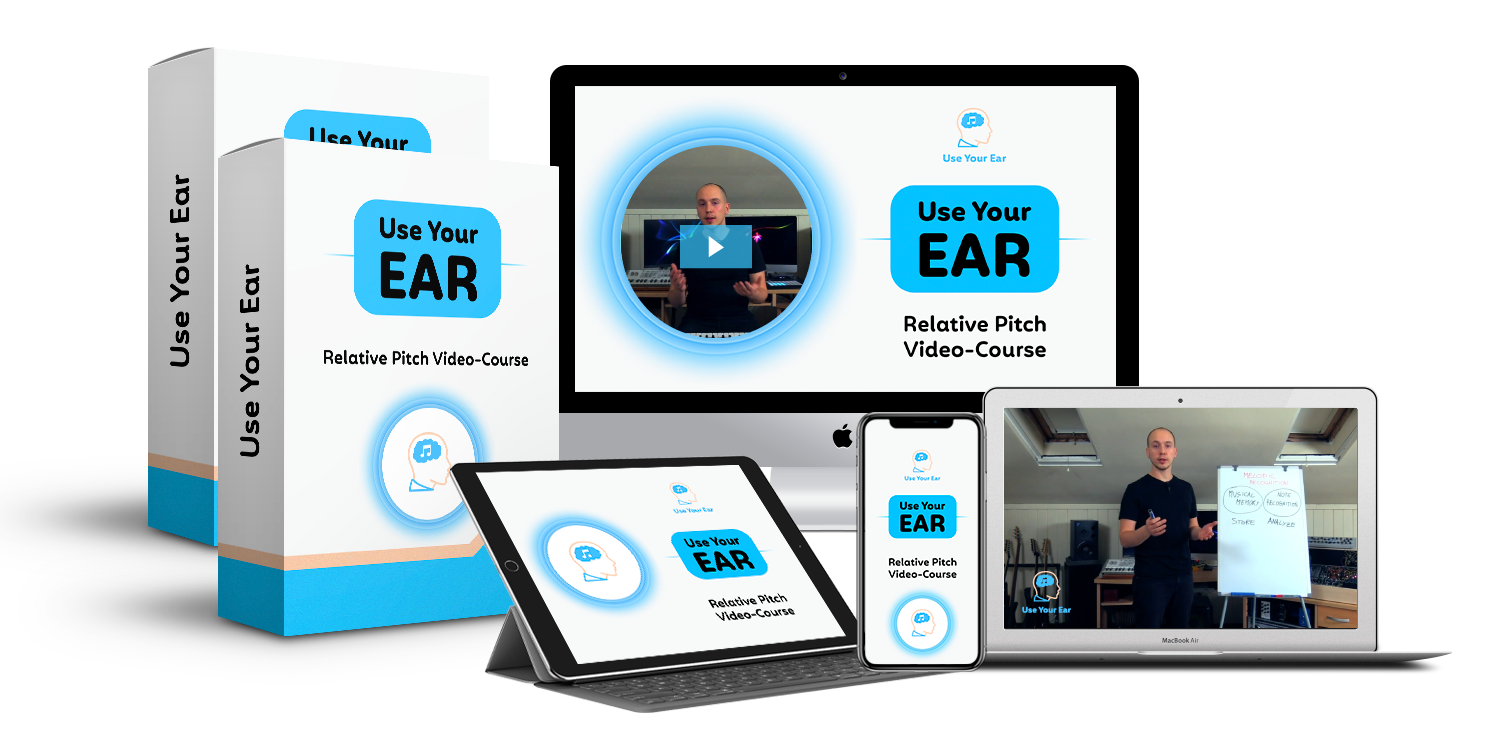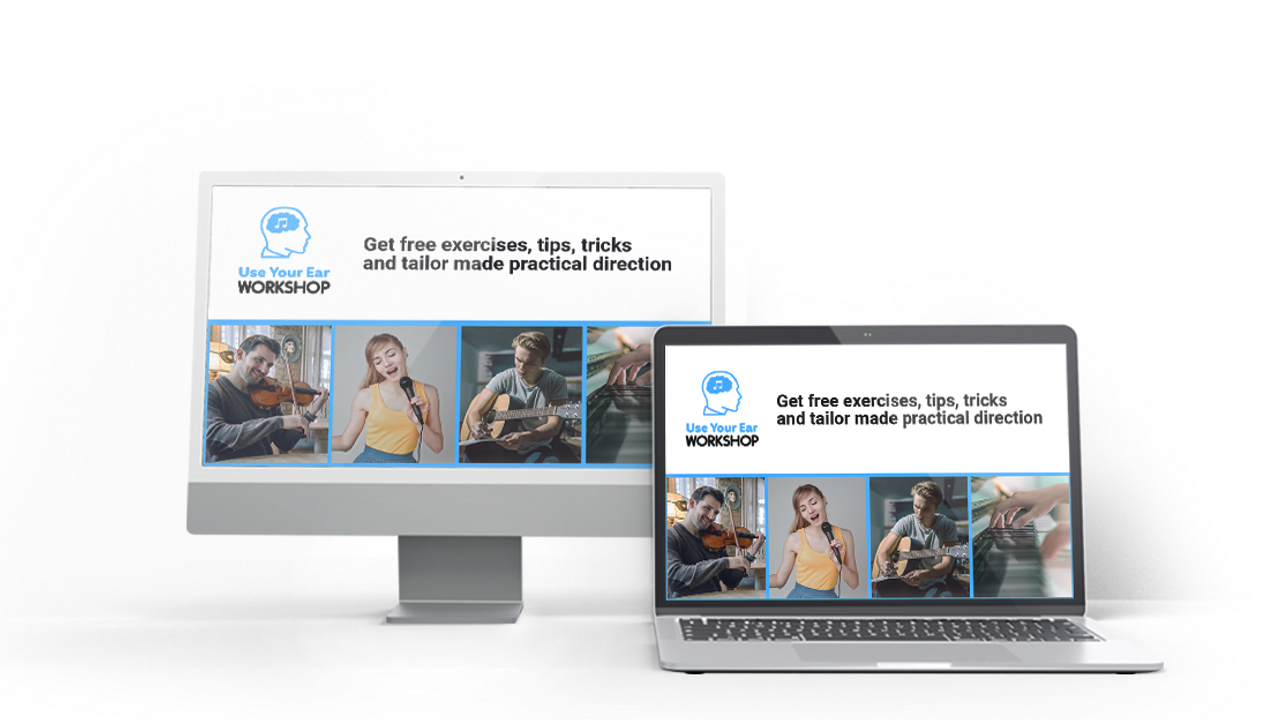Ear Training for Singers & Vocalists
Ear training is vital for any musician, but ear training for singers is essential. Vocalists cannot rely on an instrument to produce pitches for them. As a singer, you can’t just use an electronic tuner to tune your instrument once and then be done with it. You must constantly monitor yourself to make sure you are singing in tune.
A properly trained ear will not only help you to sing in tune but also give you the creative freedom to improvise, sing harmonies, and create melodies on the fly. Have you ever watched a jazz singer improvise a scat solo and wondered how they do it? Have you ever wondered how a singer in a choir maintains the right pitch when everyone around them is singing something different? How about reading sheet music as a vocalist? The answer is ear training.

What is Ear Training?
Ear training is the process of developing your ‘inner ear.’ Your inner ear allows you to hear pitches inside your head without having to hear them played on a musical instrument. It gives you a mental connection to the music which allows you to recognize and produce pitch organically, rather than simply regurgitate memorized patterns.
Ear training allows you not only to recognize individual pitches but also chords, chord progressions, and harmonies. It teaches you to find the tonal context of the music, and ground yourself in it so you can intuitively sing on pitch. Ear training for singers is also essential for developing good intonation so you don’t go sharp or flat.
Difference Between Perfect Pitch and Relative Pitch
Many beginner musicians confuse the terms ‘relative pitch’ and ‘perfect pitch.’ They think that in order to develop your inner ear and become proficient at recognizing pitch and harmony, they must have perfect pitch. This is not the case.
Perfect pitch is the rare ability, developed in very early childhood, to reproduce and recognize pitches outside of a musical context (or ‘out of thin air.’) A person with perfect pitch can be told to sing middle C, or A (440Hz), or the F# above C2, and can do it without thinking. While it is an impressive skill, it is not necessary for musical development.
Relative pitch, on the other hand, is the ability of a musician to recognize notes and chords within a musical context. By this, we mean they can hear a piece of music and understand the tonality, chords, and melodies, and reproduce pitches within that tonality because they have internalized how the pitches feel and move within the scale.
Relative pitch is the basis of a strong, well-trained inner ear and can be developed at any age, no matter your current level. Perfect pitch, on the other hand, can only be developed in early childhood, according to scientific findings.

The Importance of Ear Training for Singers & Vocalists
As mentioned at the beginning of this article, ear training for singers is crucial. As a singer, you do not have a piano keyboard or guitar fretboard to show you where the notes are. You often have no visual aid to help you know what notes to sing. You must hear the tonality of the piece, understand where your melodic or harmonic line fits into that tonality, and reproduce it in tune.
This is no easy feat! Imagine being the lead singer in a band and having only a bar or two of introduction before you have to start singing. How will you find your starting note? Imagine singing a complex harmonic line in an acapella group—how will you find your pitches? By using your inner ear and having a good understanding of how those pitches feel and function within the music.
Effective vs Ineffective Types of Ear Training for Singers & Vocalists
Not all ear training methods are alike. Some are incredibly effective, while others do not work at all. Unfortunately, most of the free ear training practice methods that you find online are absolutely inadequate for properly training your ear, and even moreso if you are training your ear to sing in tune.
Interval-Based Ear Training
Most of the ear training exercises you can find online (also those included in ear trainer apps) follow interval-based ear training methods. The problem with this approach is that they only teach you how to memorize intervals (the distances between notes) in isolation. For example, in a typical interval-based approach, you may be asked to sing (or recognize) a major fifth, a minor third, or a major third, etc. with no harmonic context given.
All you will be able to do after memorizing all these intervals is reproduce them in isolation, or in the particular way that you memorized them. But intervals sound extremely different depending on the musical context they are included in.
If you practice recognizing or producing intervals in isolation (as is done in interval ear training) you will be frustrated and disappointed when you are thrown into a real piece of music, where the intervals come in random order and start on different degrees of the scale. They will sound unrecognizable to you, and you won’t be able to apply anything that you’ve learned during your interval-based practicing routine.


Pitch Memorization
Another ineffective method of ear training for singers is trying to memorize the exact pitches included in a melody. For a singer, this might involve listening to a song over and over again on the radio until you have memorized the pitches in it.
Unfortunately, this method does not teach you to rely on your inner ear to be able to reproduce those notes on your own (without the radio or a musical instrument to help you). It’s vital to understand that (assuming you don’t have perfect pitch—and if you are reading this post, chances are you don’t), you can’t memorize the actual pitches of the notes.
You can only retain the pitches for a very short amount of time, and as soon as your mind wanders away for a few seconds, they will be gone. The only way to memorize a melody long-term, and be confident that you can recall it anytime, in any situation, is to actually learn how the melody sounds within the tonality (the harmonic context) it’s played in. That’s what relative pitch ear training teaches you to do!
Ear Training Exercises for Singers & Vocalists
Proper ear training for vocalists puts notes, chords, and intervals into a tonality or musical context and helps the singer internalize the sonic sensation that those notes/chords/etc. assume within the tonality.
Here are a couple of basic ear training exercises for singers that are tonal-based and step-by-step.

Sing the Scale
All songs are made up of notes within scales. Many vocalists neglect to practice scales because they think they are only for instrumentalists. But as a vocalist, being able to sing even just the major scale will improve your intonation, and will help you experience what “harmonic context” even means. Indeed, by learning to sing the scale you will start to suddenly realize when you go off pitch or sing notes that don’t belong to the scale of the piece your singing.
To teach yourself the notes of the scale, you will need to use an instrument at first. Using a piano is the easiest way to do it. Start on middle C, and play all the white notes from middle C to the C above it. That is a major scale.
Start by playing each note and then singing it, until you can hear each note inside your head. Then, start trying to sing the note ahead of the one you are on, without playing it first. For example, play the first note, then sing the second note. Check each note as you go by playing it after you sing it.
Once you can sing the scale up and down like this, try singing it without using the piano at all: just play middle C and then sing the whole scale up and down.
Sing Random Pitches Within the Scale
Once you can hear the whole scale inside your head, try picking out notes at random from the scale and singing those. To do this, you can start by playing the tonic (in this case, C) and then play the scale to get the harmonic context in your head.
Once you’ve heard the scale and have an idea of the tonality, try picking a note from the scale (for example, the 5th) and singing it without playing it first. Check your pitch afterward by playing the note. Then, try a different note.
Eventually, you should be able to sing any pitch within the scale, after hearing just the tonic note played. Don’t expect this to happen right away—it takes time and dedicated practice, so don’t become discouraged if you struggle.
For most people, developing the inner ear fully will require additional step-by-step exercises (which will focus on other sub-skills too) to develop this ability more gradually and without struggling a lot. If you are interested in how we can help you with that, keep reading…
Ear Training Tips for Singers & Vocalists
The best ear training for singers must do more than simply teach you how to sing or recognize intervals in isolation. You must place pitches within a musical context in order to develop a sense of the feeling and sonic sensation of those notes.
If you only ever sing notes, chords, or intervals in isolation or in a certain order, you’re only strengthening your ability to reproduce those pitches under those exact circumstances.
Effective ear training for vocalists must:
- be rooted in tonality - learning how the notes and chords sound within a harmonic context, rather than repeating intervals in isolation.
- be step-by-step - using small, manageable exercises tailored to the singer’s skill level to build gradually toward greater understanding.
- include all sub-skills necessary for ear training (pitch matching, tonic recognition, tonic retention, short-term musical memory, recognizing chord progressions, melodic recognition, etc.) and prioritize strengthening the sub-skills the singer is weak at.


Ear Training is Essential for Singers - We Can Help You
At Use Your Ear, we teach ear training for vocalists that is based on rigorous scientific studies that prove which methods are most effective for ear training. Our method has been praised by thousands of students, who say they improved much more with our courses than with interval-based ear training or similar approaches.
Our method is tonal-based and 100% step-by-step. It can be used by singers at any level to improve their intonation and inner ear. We teach all the necessary sub-skills and work with you at your level to make sure that what you are learning makes sense and allows you to improve.
Plus, the exercises you’ll do with our method are fun! You’ll learn to create real music, in real situations, by using your creativity and instinct, not just by repeating memorized patterns. And you won’t need to learn a lot of complicated music theory, either.
Relative Pitch Video-Course
The Use Your Ear relative pitch video course is the most effective ear training course for singing on pitch available. It will help you develop an instinctive feel for melody and harmony. You will master your understanding of musical pitch and finally sing in tune without even thinking about it. Better yet, you will learn how to immediately apply your new skills in real-life situations like jazz jams, songwriting, choir practice, vocal recording, singing lessons, etc.
Relative Pitch Video-Course

Free Intonation Training
Dive into our free 1.5-hour webinar on mastering intonation, designed for singers and instrumentalists. Learn the science behind excellent intonation and explore a proven approach. Benefit from practical exercises and strategies to overcome common obstacles, enhancing your intonation accuracy. Perfect for beginner and intermediate-level singers or instrumentalists. This free training doesn't require any music theory knowledge.
Free Intonation Training
Individual Online Lessons
Our individual online lessons offer one-on-one guidance tailored to your specific needs. Ear trainer apps don’t provide useful feedback or a deep understanding of the cognitive processes involved in ear training. An ear-training teacher, on the other hand, can give customized feedback, and assess your current skill level and sticking points. Consequently, they are in the position to offer greater insight into your learning process or support you while you dig into advanced concepts and develop additional skills.
One-on-one ear training lessons online
Who Are Our Courses For?

Our ear training courses are perfect for people who want an effective pathway to developing their inner ear.

Whether you are a singer or an instrumentalist, a total beginner looking to learn the basics, or a seasoned pro hoping to break through to the next level, our courses will meet you where you’re at and push you to greater musical heights.




